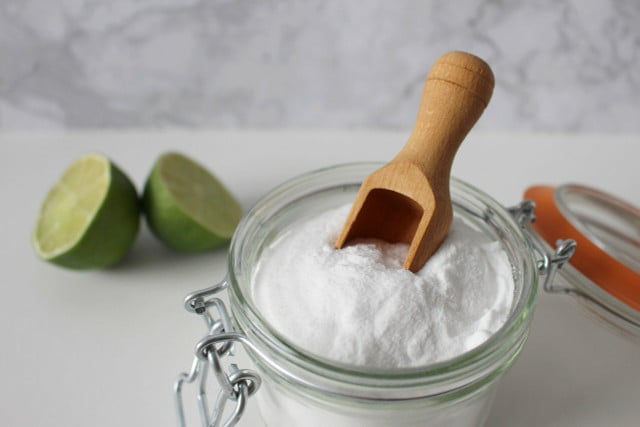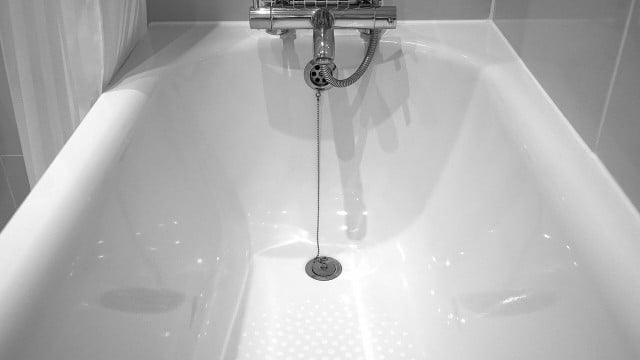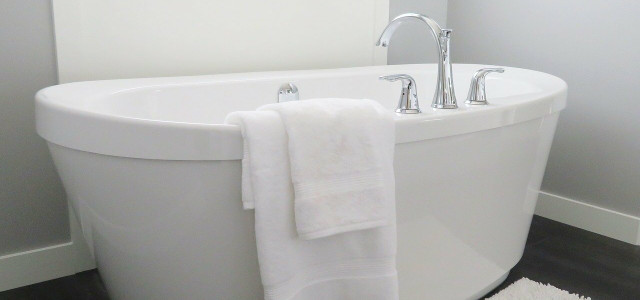Looking for the best way to clean your bathtub without using harsh chemicals? We’ll show you how easy it is to make your own bathtub scrub using baking soda.
Making Your Own Eco-Friendly Bathtub Scrub

As most of us already know, baking soda is incredibly versatile in and around the home. From homemade carpet cleaner and DIY oven cleaner to homemade deodorant and zero-waste toothpaste, you will find that baking soda is a staple ingredient of many DIY household remedies. Sodium bicarbonate (NaHCO₃) – aka baking soda – has a pH level of 8.4, which means it is entirely safe for your skin and by extension your bathtub surface.
This baking soda scrub is the best way to clean your bathtub without using caustic chemicals. Put away the borax, the concentrated bleach, and nasty chemical solvents when cleaning your bathtub, and instead take 5 minutes of your time to mix up your own gentle baking soda bathtub scrub. You will most likely have all of these items in your home already.
Remember: To prevent damage, check to see what the surface of your bathtub is made of (see below).
You will need:
- 1 cup water
- 2 tablespoons baking soda
- 1/2 cup vinegar (do not include for porcelain bathtubs)
- Juice of 1/2 lemon
- 1 spray bottle
Mixing the baking soda will soften and break down its grains to help prevent scratches from forming.
After lightly spraying your bathtub surfaces with your baking soda scrub, use a textile cloth to gently rub down the bottom and sides of the tub to remove any dirt and soap scum. Not only will the lemon juice give your bathtub a fresh fragrance, but the natural oils found in it will also act as a protective layer to the tub, giving it a nice glossy finish.
Note: Avoid harsh scrubbing and do not leave your solution on the bathtub surfaces to ‘soak’. You will need to rinse thoroughly and dry off with a clean towel or sponge so as to not potentially damage tiling grout or silicone sealants around the bathtub itself.
You have probably heard of washing soda and assumed it was the same as baking soda. Not really, find out more about the two here: Washing Soda vs. Baking Soda: Is There a Difference?
Advice For Cleaning Different Types Of Bathtub Surfaces



Different types of materials are used when manufacturing bathtubs. You will need to consider these carefully before cleaning and scrubbing with baking soda in order to avoid damaging the bathtub. Always consult a professional if in doubt, but in the meantime, the simple measures for cleaning different types of bathtub materials outlined here should take some of the guesswork out of it for you.
Porcelain Enameled Steel Bathtub
When cleaning a porcelain bathtub, avoid using abrasive cleaners as they can chip the surface of the bathtub. When using baking soda, do not include white vinegar in your liquid mix as this can damage your bathtub’s finish. Clean gently just once a month, excess cleaning will only lead to more wear and tear. If you wish to give your bathtub a glossy appearance, apply some lemon oil to the sides of the bathtub.
Enameled Cast Iron Bathtub
Made up of molded iron and coated with enamel, these bathtubs are extremely robust and durable, and for that reason are more expensive than other kinds of bathtubs. The thick enamel coat makes it resistant to chipping and scratching, making it ideal for cleaning with your baking soda scrub solution.
Acrylic Bathtub
When it comes to an acrylic bathtub, caution is the key. Acrylic plastic can be easily damaged by the effects of chemical and abrasive materials, so it is highly recommended to be all the more careful when cleaning an acrylic plastic bathtub with your baking soda mix.
Fiberglass Bathtub
Fiberglass bathtubs are created with layers of surface coat, polyester resin, and fiberglass reinforcements. Because of this, they are not as durable as your typical cast iron bathtub and need to be cared for accordingly. The finish tends to fade away with constant use and cleaning and the materials are highly susceptible to chemical damage.
Bathtubs Made of Cast Polymers
Engineered using natural stone or solid surface materials that are molded together with minerals, polymeric materials, and resins, proper care must be taken while cleaning cast polymer bathtubs. Abrasions from excessive scrubbing can quickly destroy the protective outer coating of the tub. Therefore, it’s best to avoid using abrasive scrubs and chemicals on it.
Handy Tips To Keep Your Bathtub Clean – Naturally



- So you don’t have to constantly resort to using your bathtub scrub, you can reduce its use (and also protect your bathtub surfaces from abrasions over the long term) by keeping your bathroom well ventilated so steam and moisture do not build up, leading to mildew and mold.
- Don’t leave your soap or shampoo bottles on the bathroom or bathtub floor as this can cause more stains and marks to emerge. The acids in these products can damage the sealed surface of the bath, leading to cracks and the potential for bacteria to grow.
- Don’t just clean the dirty area. Clean the whole bathtub and bathroom for a clean and germ-free environment. Clean the sides, corners, and all-around to make sure that your bathtub is entirely free of dirt and mold.
- Trim your shower curtain to match your bathtub. When the shower liner clings to the side of the bathtub, this area can become a fertile breeding ground for mold, mildew, and germs.
- You can use organic body wash gels to lessen the build-up of soap scum. After a bath, consider rinsing the tub quickly and wipe down with a clean towel to allow it to dry more thoroughly.
Along with your handy homemade baking soda scrub, these easy steps will make sure there is no need to use harsh chemical cleaners in your bathtub again.
Read More:
- How to Clean Grout: Natural DIY Grout Cleaner
- How to Remove Soap Scum: 3 All-Natural Home Remedies
- Unclog Your Drain Without Harmful Chemicals
Important Information regarding Health-related Topics.
** Links to retailers marked with ** or underlined orange are partially partner links: If you buy here, you actively support Utopia.org, because we will receive a small part of the sales proceeds. More info.Do you like this post?






